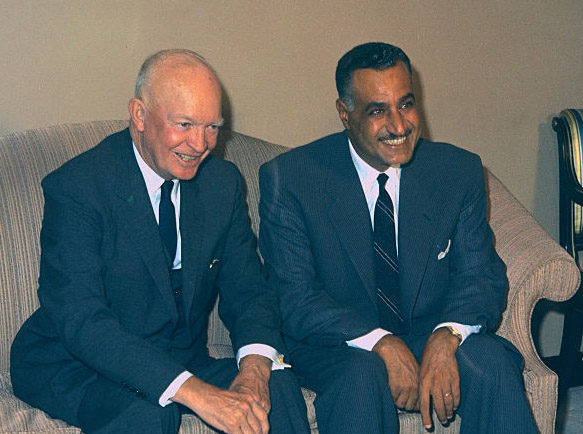Australia/Israel Review
Biblio File: Ike and the Mideast Delusion
Nov 7, 2016 | James Traub

James Traub
Ike’s Gamble: America’s Rise to Dominance in the Middle East
by Michael Doran, Free Press, 2016, 292 pp., US$28.00.
From the moment he took office in 2009, President Barack Obama tried to repair America’s standing in the Middle East by demonstrating his sincere concern for the grievances and aspirations of Arab peoples. He gave interviews to Arab news outlets. He issued New Year’s greetings to the people of Iran. He delivered a speech in Cairo in which he acknowledged America’s past wrongs, and he called on Israel to accept the legitimacy of Palestinian demands for a state. Mr. Obama did almost everything liberal critics of the policies of George W. Bush wished him to do. And he failed. Or rather, he found that the Arab world was afflicted with pathologies that placed it beyond the reach of his words and deeds.
Had Mr. Obama had the chance to read Ike’s Gamble, Michael Doran’s account of President Dwight D. (“Ike”) Eisenhower’s statecraft before, during and after the Suez Crisis of 1956, he might have saved his breath. Mr. Doran, a scholar and former State and Defence Department official in the George W. Bush Administration, describes a seasoned, wily and prudent President who aligned the United States with what he understood to be the legitimate hopes of Arab peoples, even at the cost of damaging relations with America’s closest allies – and made a hash of things.
Mr. Doran illuminates a narrative with which very few non-specialists will be familiar. His tale begins at the moment in the early 1950s when America was reaching its zenith. The United Kingdom was reluctantly acknowledging the end of empire, and the United States was filling the vacuum in the Middle East. Neither Eisenhower nor his fervently anti-communist Secretary of State, John Foster Dulles, understood this transition in strictly geopolitical terms; both believed that the liberating American faith in national self-determination and consent of the governed would supplant Britain’s self-aggrandising colonialism. Both morality and national interest dictated such a course. As Dulles said in a prime-time televised address in 1953: “We cannot afford to be distrusted by millions who could be sturdy friends of freedom.”
The familiar story – and it is all too true – is that Cold War competition led the United States to side with friendly but despised dictators in the region like Iran’s Shah Muhammed Reza Pahlavi. Yet at the same moment that the US was plotting to overthrow Iran’s democratically elected leader in favour of the Shah, leading policy makers were infatuated with Egypt’s immensely popular revolutionary leader, Gamal Abdel Nasser.
Eisenhower and Dulles saw in Nasser the kind of nationalist leader whom America needed to recruit to its side in order to demonstrate that post-colonial nations were better off in the democratic than in the communist camp.
The problem was that in order to do so, they had to sell out their closest ally. To British Prime Minister Winston Churchill, Britain’s 80,000-man garrison in Suez was irrefutable proof that his nation remained an imperial force. But Eisenhower and Dulles took Nasser’s side in 1953-54 as he whittled away at British influence and demanded that Britain withdraw its forces. Unintimidated by his former wartime ally, Eisenhower brusquely advised Churchill to defer to “the very strong nationalist sentiments of the Egyptian Government and people” by agreeing to hand over control of the base. Churchill had loudly declared that he had not been elected prime minister to preside over the liquidation of the British Empire; having no choice, he now agreed to do just that.
Britain was one impediment to America’s grand bargain with Nasser; Israel was the other. Eisenhower, Dulles and State Department officials feared that the United States would never win Arab hearts and minds if it was seen as the ally of a nation that almost all Arabs reviled. The problem has hardly gone away over the past six decades. But while the American response today is to gently prod Israel to rein in the growth of settlements, the answer in 1955 was to push Israel to make unilateral territorial concessions – and, remarkably, to present the plan to Nasser for his approval before disclosing it to the Israelis. Mr. Doran makes it clear that the antisemitism of the Washington elite converged with what seemed at the time to be perfectly sound strategic calculations.
But Eisenhower’s “gamble” was based on a delusion. Nasser was not an Egyptian George Washington or Moses, determined to lead his people out of colonial bondage and into a proud independence, though this witty and roguish figure did a fine job of playing those roles for gullible American diplomats. Mr. Doran shows that while Nasser claimed to be a moderate barely surviving the pressure of hardliners, it was he who was pulling the strings. Nasser spoke of Israel as a consuming passion while viewing it more as a highly useful rhetorical target. He showed interest in buying arms from the US while secretly concluding a deal with the Soviets. By now the British knew better and tried to drag the Americans off their high horse. But that was dismissed as special pleading.
Nasser was, of course, an Arab nationalist. But he was also an empire builder who saw America’s Arab allies – Jordan, Iraq and Lebanon – as dominoes to be knocked over on his path to regional hegemony. At the same time that Washington was propping up Iraq’s King Faisal and Jordan’s King Hussein, Nasser was dispatching his agents to torpedo their rule. (He succeeded in Iraq and failed in Jordan.) The great irony was that while the United States was increasingly viewed as the enforcer of the global status quo, it was bestowing blessings on the man most determined to upset it.
The truth dawned – but slowly. When Nasser executed his master stroke, nationalising the Suez Canal in July 1956 – Mr. Doran calls it Egypt’s “declaration of independence” – Britain demanded that Washington join it and France in a war to regain a precious colonial-era prize. Ike demurred. “The whole Arab world would unite in opposition,” CIA Director Allen Dulles advised.
Readers today will reflexively think: If only George W. Bush had received the same advice before invading Iraq. Probably it was good advice. Yet Nasser, once spared by American non-intervention, would go on to stoke the forces of Arab nationalism and prosecute two more wars against Israel. Ike learned, as Messrs. Bush and Obama would learn decades later, that he could not put the US on the right side of Arab public opinion.
Ike’s Gamble is a thoroughly researched, closely argued work of traditional diplomatic history, albeit enlivened by the occasional irreverent analogy to US-British collaboration in Ian Fleming’s James Bond novels.
It brings us back to a time when America had real options in the Middle East, when diplomacy was mostly left up to the diplomats, and when Wise Men in Washington tried to do Wise Things. What are we to make of their failure? Mr. Doran tells us that Ike ultimately came to see Suez as his “major foreign policy mistake.” He should not have cut the legs out from under England and France, nor sided with Egypt against Israel.
Mr. Doran ends by re-running the tape loop of history, only this time with an already wised-up Ike. That Ike, he imagines, would have joined with his European allies “to smash the illusion of Nasser’s inevitable triumph” and thus discredit Nasser’s revolutionary pan-Arabism. Well, yes, and in retrospect George W. Bush would have done some nation building in Iraq, and Barack Obama would have taken the Islamic State much more seriously in 2014. Everyone is wise after the fact. But even hard-headed realists like Eisenhower sometimes get snookered, in part by their own wish for the world to be more amenable to American values, and American power, than it is. And nowhere do American leaders fall into that trap more than in the Middle East.
The inference one draws from Ike’s Gamble is not: Do nothing in the Middle East. When you are the United States, not doing is every bit as fateful a decision as doing. (See: Syria.) It is rather: Do not trust appealing strangers. (See: Ahmed Chalabi.) Do not try to be too clever. Lower your expectations. And adopt, as Mr. Doran writes in closing, “a tragic perspective.”
James Traub is a fellow at the Center on International Cooperation, and author of the book John Quincy Adams: Militant Spirit. © Wall Street Journal, reprinted by permission, all rights reserved.
Tags: Egypt






